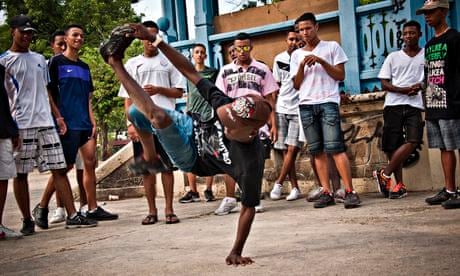"Congratulations to all of us who chose dance instead of drugs," reads the latest hourly Facebook update from Cebolinha, a tough and rangy 24-year-old who is one of the pioneers of the passinho Brazilian urban dance craze. Coming from Piedade in Rio de Janeiro's Zona Norte, Cebolinha, whose real name is Jefferson Chavez, knows plenty of people who chose the latter.
Hailed by some as the new capoeira, passinho is a lightning-quick dance style that evokes 1980s b-boy battles in the Bronx, as performers push their physical limits in exhilarating head-to-head contests. Within the space of a decade, it has gone from a side attraction within the bailes funk – those raucous, illicit parties that light up Rio's outer neighbourhoods – to a national phenomenon with primetime TV slots, lucrative sponsorships and star status for a lucky few.
Its unstoppable rise has been catalysed by YouTube. It was in September 2008 that the first passinho video surfaced of friends from the Jacaré area of Rio fooling around at a barbecue. Passinho Foda or "fucking crazy" passinho, which has now notched up over 4m views, unleashed a fever. A torrent of copycat videos followed as each Rio community tried to earn bragging rights over their neighbours. Online forum Passinho Foda became the laboratory for the nascent style, its role pivotal since Rio's three rival drug factions restrict residents' movement between favelas.
"I owe everything to the internet," says 18-year-old Michel Gomes, AKA Michel Mista Passista, one of the scene's most thrilling dancers despite suffering from phocomelia, a congenital condition that left him with underdeveloped arms. "Without it, I would never have discovered passinho."
In bedrooms across Rio youngsters like Tico Maneiro, who runs the YouTube channel Improvizoides, are editing and uploading zero-budget videos from their laptops. The footage is often shot on phones and features dancers practicing in cramped living rooms, or on concrete rooftops with Sugarloaf Mountain as a backdrop. Many perform barefoot, freely improvising from such Brazilian dance styles as samba, capoeira and frevo, as well as free step, hip-hop – and even ballet.
Reading this on mobile? Click here to view video
It all caught the eye of Emílio Domingos, who captured the phenomenon in Passinho Dance-Off, a feature-length documentary. He was thrilled to see "such a varied group of artists spread out all across the city, with no money but mobilised by the internet. To see kids between the ages of three and 23 developing such a sophisticated art form is extraordinary."
The film, which won the New Directions award at Rio's 2012 international film festival, follows a group of dancers during a citywide competition to crown the king of passinho. At its core is the friendship between Cebolinha and the scene's other lynchpin, Gambá, a 21-year-old plasterer who dances in purple leggings and whose contagious joy for life lights up the movie.
Tragically, before the film was finished Gambá was dead. He was murdered while on his way home from a party, possibly in a homophobic attack. "Things were going so well for him," says Domingos. "He was reaping the rewards of all his hard work. His death was a huge blow, not just to friends, but to anyone who believes in a better city."
Yet what Gambá and his followers had set in motion was not about to die. By the time of the second Passinho-Dance Off in 2013, there were 722 entrants, 16 elimination rounds and a whopping sponsorship deal from Coca-Cola, with the final broadcast on Luciano Huck's hugely popular weekend TV show. The dance was evolving, too, moving away from footwork to more acrobatic displays of physical prowess.
After the buzz created by the competition, a TV producer hand-picked six of the most telegenic competitors and formed the Dream Team, an all-singing, all-dancing pop group that has starred in an advert for Coca-Cola. Not everyone is happy about the craze's newfound popularity. "People used to do it out of love," laments Tico Maneiro. "Now it's all about fame and money."
But passinho may even be changing kneejerk reactions to favela culture among Brazil's white middle classes. "Beforehand," explains Leandra Perfects, who helps run the Passinho Foda forum, "people saw young people from the favelas as threatening because of their connection to criminality. With the arrival of passinho, people have begun discriminating between criminals and dancers."
In the runup to the World Cup, the bailes funk, the natural breeding ground for passinho, have been closed down in unprecedented numbers – one of the most unpopular aspects of the city's pacification programme. However, a second generation of dancers are creating an even faster, more frenetic style, in their bedrooms, on street corners, as well as on television and in live music shows. They're even taking it abroad: one group, starring female dancer Marcelly Fantástica, is currently getting ready for a summer show in New York as part of the city's Out of Doors music and dance festival.
"Passinho is bringing peace to the city," says DJ Vinimax, whose records have soundtracked the scene from its beginnings. "Next it needs to incentivise the kids to finish their studies, to go to university, to become doctors, vets and lawyers."

Comments (…)
Sign in or create your Guardian account to join the discussion